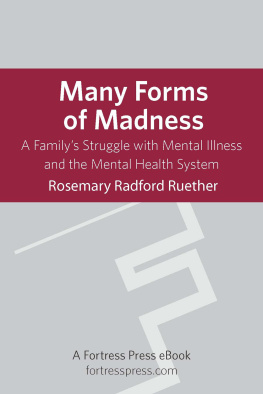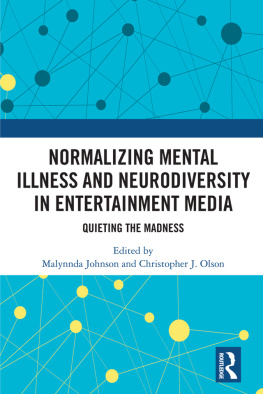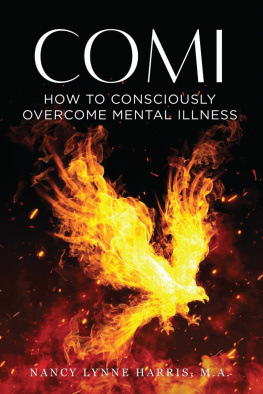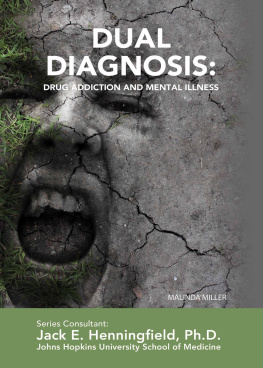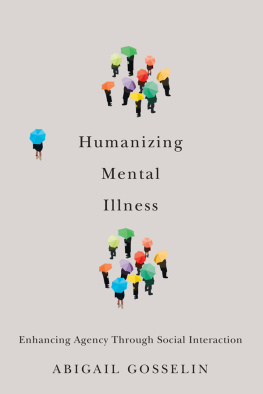
MANY FORMS OF MADNESS
A Familys Struggle with Mental Illness and the Mental Health System
Rosemary Radford Ruether
With David Ruether
Fortress Press
Minneapolis
Many Forms of Madness
Many Forms of Madness is an intriguing, gripping account of personal and family pain around a loved ones need and the societys failure to provide help. This is a must read for persons and families dealing with the mental health system and for pastoral/spiritual caregivers caring for them. This work gives a candid view of the ways in which these needs are not adequately being met and suggests ways in which changes could be made to improve care.
Teresa E. Snorton
Executive Director
Association for Clinical Pastoral Education, Inc.
MANY FORMS OF MADNESS
A Familys Struggle with Mental Illness and the Mental Health System
Copyright 2010 Fortress Press, an imprint of Augsburg Fortress. All rights reserved. Except for brief quotations in critical articles or reviews, no part of this book may be reproduced in any manner without prior written permission from the publisher. Visit http://www.augsburgfortress.org/copyrights/ or write to Permissions, Augsburg Fortress, Box 1209, Minneapolis, MN 55440.
Unless otherwise noted, Scripture quotations are taken from the New Revised Standard Bible, copyright 1989 by the Division of Christian Education of the National Council of Churches of Christ in the USA. Used by permission. All rights reserved.
Cover image: Profile of a mans head with a spotlight on his brain. Bulls Eye/ImageZoo Illustration Disc: Targeting Health. Royalty free.
Cover design: Laurie Ingram
Book design: PerfecType, Nashville, TN
Photos courtesy of Rosemary Radford Ruether and David Ruether
eISBN 9781451417814
Library of Congress Cataloging-in-Publication Data
Ruether, Rosemary Radford.
Many forms of madness : a familys struggle with mental illness and the mental health system / Rosemary Radford Ruether ; with David Ruether.
p. cm.
Includes bibliographical references and index.
ISBN 978-0-8006-9651-1
1. Ruether, David, 1959Mental health. 2. SchizophrenicsCaliforniaBiography. 3. SchizophrenicsFamily relationships. 4. Mental illnessTreatmentUnited States. I. Ruether, David, 1959 II. Title.
RC514.R84 2010
616.8980092dc22
[B]
2009042225
Contents
I wish to thank Bob and Laura Fukada who read and commented on this manuscript from their experience. I thank Pete Sabey, a practicing family therapist, and Jim Poling, of the Garrett-Evangelical Theological Seminary Pastoral Counseling Department, who gave the manuscript a careful reading from their long experience in the family therapy and pastoral psychology fields. I thank Kathleen Greider of the Claremont School of Theology Pastoral Care and Counseling Department for helpful advice and the loan of many of her books in the research for this book. I thank Dick Bunce who gave a critical reading of several chapters from the perspective of his long history with the Mental Health system of Los Angeles County. I thank Theresa Yugar and Diane Ward, doctoral students at the Claremont Graduate University, who read and commented on the manuscript from their personal experiences. Finally I thank Mary Elizabeth Ruether and Rebecca Ruether who read the manuscript from the perspective of their own history with their brother. Finally I thank Herman Ruether, faithful companion in this journey, who read and commented on this entire manuscript.
I am writing this book for and with my son, David Christopher Ruether. It represents our almost thirty years of struggle with his mental illness that has debilitated him since his late teens. It also is about our struggle as parents with the mental health system in the United States, as we have pursued our son through his vicissitudes of hospitals, nursing homes, and board-and-care homes in the search for better advice and better treatment for his illness.
I have folded Davids personal story into the story of the changing face of how those with mental illness have been treated in the United States, from colonial times to the present. I brought in this historical context not only because I am a historian and deeply interested in how ideas and practices have developed historically but alsoand more importantlybecause of my realization of how little has changed in the treatment of those with mental illness.
The usual view of the history of the treatment of those with mental illness is that while there may have been some barbaric treatment in the past, it has now been overcome. The development of psychotropic drugs and the emptying of mental hospitals in the 1950s to 1970s signaled the dawn of enlightened treatment of these people. It is said that society now realizes that this illness is simply a physical disease like any other; it is treatable with medications, and those who suffer from it can live as valued members of society. However, the reality of the situation
Tragically, each of the shifts has been accompanied by great waves of reform led by idealistic reformers determined to rescue those with mental illness from abusive situations and give them a truly humane and dignified life. So what has gone wrong with these reforms? Why do we as a family with a son with mental illness struggle with such poor alternatives today? Answering these questions is an integral part of the story contained here. It also tries to envision better alternatives, to imagine what our society would do for those with mental illness if we really cared, and it presents some examples of groups who are doing a better job.
This book is primarily the fruit of my research and writing, but it is also an expression of a family collaboration. Herman Ruether has been a central part of this struggle with Davids mental illness over the years, and he has been a constant consultant on this book, reading and discussing all its chapters. David has also been an integral part, not only because it is his story but also because his own experiences, thoughts, and writings have been brought in at many points. I have consulted him on many issues and at times have quoted verbatim some of our conversations. His own writings play an important role in the narrative. This book seeks to make Davids voice heard. His two sisters have also played a role by reading major parts of the manuscript and giving me feedback and sharing how they want their own experiences represented.
I wish to say a word about terminology in this book. I have avoided the terms the mentally ill or a mentally ill person since they seem to essentialize mental illness as the identity of the person. Just as we would not refer to a person with cancer as a cancerous person, so we should not refer to a person with mental illness as a mentally ill person. I have adopted a number of ways of referring to different individuals and groups with mental illness in terms of the context. In the traditional hospital for persons suffering from mental illness, the term patient seems appropriate. I occasionally use words like maniac, crazy, and insane, but only as references to past historical usage, and usually in quotes. Several movements, such as Thresholds and the Village, see themselves as communities and call the people who participate in their movement members, while Gould Farm refers to them as guests, so I use these terms in the context of these movements.
Next page
